How to Make Money Blogging
How to make money blogging is one of the top concerns for bloggers. I understand it; having a blog is wonderful, and perhaps you even enjoy writing as a hobby, but ultimately, unless you start earning money online, it will always be simply a hobby.
This article on how to get money blogging is entirely devoted to assisting bloggers in comprehending the various ways they might earn their first $500 as a blogger.
Can you get a raise from that? Sure! To ensure that you have an achievable aim and don't become overwhelmed, let's begin with that objective.
But first, a little about me.
I want to start off by saying that I can relate to you because I was in a similar scenario in 2014. I launched a lot of blogs, put a lot of money into them, and they all failed.
You can view my blog income records here. I kept track of all of my earnings and outgoing costs during those times.
If you don't want to read my reports, you can see below that when I first started, I barely made any money each month.

When I figured out how to make money blogging, all of the consulting work that came from building my website paid off.
Before it wasn't, passive income seemed like a pipe dream.
Having said that, I see how challenging it is for newbie bloggers to earn money because they don't yet have a specific audience and are simply attempting to expand. I’ve been there myself.
I've learned a lot since then, developed tremendously, and last year, I generated over $200,000 from my own network of blogs.
I am familiar with what it's like to start a blog from scratch and what it takes to grow a lucrative blog that brings in thousands of dollars each month.
As opposed to some other "gurus" out there, I've been through this process numerous times, and I actually follow my own advice.
To be clear, I'm not bragging when I tell you how much money I've made; rather, I'm sharing these blogging strategies with you to demonstrate that I understand your situation and what is feasible if you take the appropriate actions.
It all starts with the blog you create.
One thing that never ceases to amaze me is how some people enter the blogging world and start new blogs or aimless entries on various topics they are interested in or are dealing with.
They start a new self-hosted WordPress blog instead of using the free domain name that hosting providers offer by purchasing a domain name, web hosting account, and server from a company like Bluehost. (They would realize they needed to do more than this if they had taken my IGNITION course, but I digress.)
It’s great that they took a step to start their own blog. I give them credit…..
But this is where the problem starts for new bloggers…
They view blogs as digital diaries and have read that "if you write it, they will come."
These people often just blog for a few months. Following that, they won't spend any money on assistance-related tools.
Because they view outsourcing as an expense rather than an investment, they don't want to do anything.
And frankly, I don’t feel bad for these folks.
You must approach your blog like a business if you want it to be successful. Many popular blogs do this, and you ought to follow suit. Consider your blog as a piece of online real estate for your company.
Have you ever witnessed a small firm expand successfully without any funding? No, is the response.
Your blog is no different from other blogs in that it needs an investment of some kind to flourish.
Whatever the medium,
Great bloggers treat this as a business, and that's why they succeed. Tools to help you become more productive, classes to help you understand blogging, or outsourcing duties to save you time are just a few examples.
However, it's not only that.
People who establish blogs with the intention of making money put a lot of effort into making sure their blogs have some sort of profit motive.
What am I referring to here?
To prove my thesis, let's quickly contrast two separate blogs.
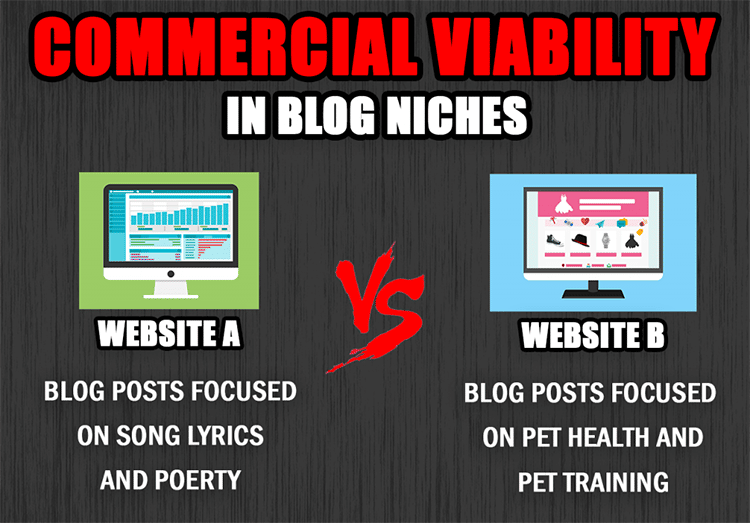
Which of the two separate blog niches mentioned above do you believe has greater commercial potential?
You are right if you chose Website B as your response.
Commercial viability in the context of a blog refers to the extent to which businesses will be interested in the content you have created (or had created by a content writing agency you have engaged).
Let me elaborate on this.
If you decide to create Website A, you would have a blog that was devoted to poetry, lyrics, the definition of terms in English, and deciphering the meaning of various song lyrics.
How can you generate money from a blog like this even though there is an audience for it and you might receive some decent traffic?
There will be a significant demand for advertisers because the blog posts you publish have little to do with any particular firm. On the other hand, low demand results in fewer affiliate products, lower earnings per click, and consumers who never planned to spend money in the first place.
Website B, on the other hand, publishes blog articles regarding pet care and training. A blog's niche has very high commercial viability since advertising wants to sell their goods to their audience. If you want, you may even set up an online shop where you can market and sell your own eCommerce goods to customers.
Reflect on it
Pet training offers behavioral specialists, goods that can help, and treatments. Pet health has many physical products, including pet vitamin firms, pet food companies, veterinarians, and pet toys that encourage physical exercise.
This list from Diggity Marketing demonstrates the wide range of pet-related affiliate programs available. Even if this list only includes dog-related products, the point is that there is no lack of commercial potential in the lucrative pet segment.
Do you see the difference?
Compared to website A, website B is substantially more commercially viable. As a result, you'll be able to generate more revenue and passive income as your business expands, increasing your chances of success.
You need to choose a blog niche that is commercially feasible in order to produce successful blogs. If you're looking for the best profitable niche and monetization techniques, you might want to check out this free course I'm offering.
Now that you are aware of the commercial viability of choosing a blog niche, let's move on to the list of various strategies you can employ as well as the detailed instructions for monetizing your blog.
1) Affiliate Income
For those who are unaware, if you find a good product or service, you may link to it in your blog posts and earn a small referral fee when readers click on it and make a purchase.
Since you don't need a lot of visitors to your website to earn money blogging, this is a terrific approach to start earning money online through blog monetization.
If you have the correct content, it may only take 100 individuals to view a blog article before one of them clicks and makes a purchase of one of the things you suggest.
Where to Find Affiliate Programs
Utilizing affiliate programs is one of the most common suggestions made while learning how to monetize your blog.
Let's go over some of the most common choices.
Share a Sale
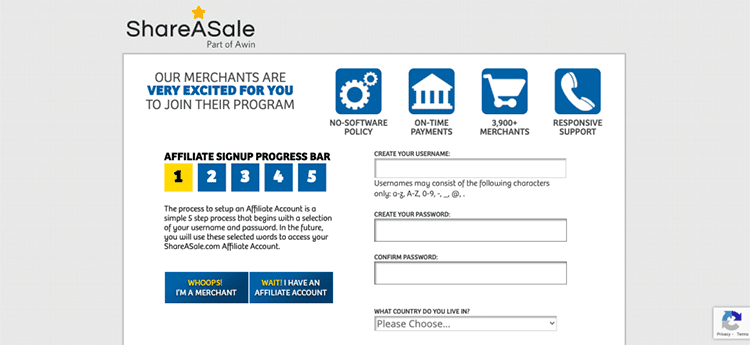
Start with ShareASale.com. In order to obtain an affiliate connection with the platform, numerous businesses joined and hosted their affiliate programs in this network of businesses.
If you're just getting started, this is a great alternative since, if you haven't found the proper things to promote, you can locate many different businesses in various blogging themes that will complement your efforts.
You can apply to numerous programs using this platform, and once accepted, you can manage them all from a single interface.

Commission Junction is the next. Another affiliate network where everything can be managed in one location is this one. One of the first affiliate networks ever established is this one.
Amazon Associates
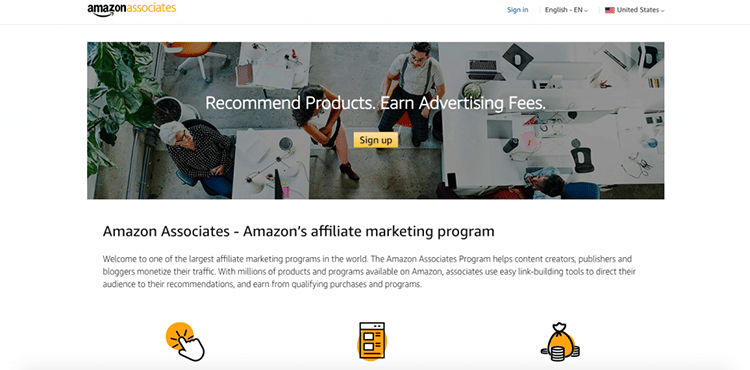
Applying to Amazon Associates is possible. Not everyone is aware of this, but you may earn money from an Amazon product if you link to it from your blog and one of your readers clicks on the link and buys it.
I still make $500 to $1000 each month with the Amazon affiliate program, despite the fact that they pay relatively little (1-5% in most situations) compared to other programs. The reason is that despite having a low commission rate, Amazon is incredibly effective at converting customers.
Use Google
Check with a quick Google search if you enjoy a good or service and want to suggest it to others while simultaneously trying to monetize your site.
The majority of the time, you may join an affiliate program by just typing the company name and "affiliate program" into a search engine. If you started a finance blog, for example, there aren't many things on Amazon that would be a good fit for you, but many would come up in a Google search.
How to Start as an Affiliate
How do you get started with affiliates? It’s pretty easy.
1. Grow your blog to 25-50 visits/day
Typically, you want your blog to receive 25 to 50 daily visitors. Because you need to have some traffic in order to be accepted for an affiliate network, it would be preferable if you have this.
If not, they'll look at your blog and decide not to accept you because you don't have any traffic. Thus, you won't even have the opportunity to make a sale.
2. Make a list of products/software that you use
If there is enough traffic, I suggest making a list of the goods you use or enjoy and deciding whether you want to offer them on your website. This strategy appeals to me because you'll have firsthand knowledge and will consequently be an authority on the subject, making it much simpler to produce blog content.
3. Sign up for affiliate programs
You can enroll in all of the affiliate programs. You'll typically be approved for those programs if you just tell them a little bit about yourself, your website, and how it's developing.
Each affiliate program's application process takes 5 to 10 minutes, requires simple information, and allows you to include affiliate links in your posts.
4. Create Blog Posts and Content
I strongly advise concentrating on writing "Best," "Vs." or "Review" content if this is your starting point. For a blog to be successful, keyword research is essential, so take your time or use a service.
The goal of "best" content is to inform readers about their best options when purchasing a certain good. To find the greatest products you can write about, conduct keyword research for each type of content. For instance, I published a post about the top YouTube editing tools. If readers click on one of the links in this post and purchase one of the suggested solutions for YouTube video editing, I may receive a referral fee.
“Vs.” Content: Although I haven't produced a lot of this high-quality material, it's a great method to develop engaging affiliate content. Here, you would compare two products side by side to determine which one is superior. I might compare Wincher to other keyword rank-tracking applications, for example.
“Review” Content: When you wish to concentrate on a single product and conduct an in-depth review, you develop this kind of material. I've written reviews for Thinkific, Learnworlds, Systeme.io, and even Thrive Themes. Any piece of software that you enjoy can be reviewed. To enable you to monetize it, just make sure they have an affiliate program.
You can see that the Thrive Themes review is pretty thorough, and everybody who visits it has the option to use my links to buy the program. I also look at some analytics, and as you can see below, this one piece has generated almost $13,500 in commissions for me.

2) Consulting Services
The next method of earning money through blogging is consulting, which is easy to do if you have a certain specialty. For instance, I blog on online commerce and internet marketing.
I had experience in digital marketing when I launched the website, so I decided to provide consultancy services. For me, it was quite simple because my previous employer asked me to work independently for three months while they hired a new employee.
The idea here is that you may offer yourself as a consultant for various organizations if you have a successful blog on a particular marketable topic or issue. The hardest aspect of running a business is getting clients, but if your site is drawing the proper readers, it can be done.
How to Start Consulting
1. Ask your current or most recent employer
An excellent place to start is with your present or most recent employment. You can put in your two weeks and mention that you'd love to continue as a consultant if they have you, for instance, if you want to quit your job and start blogging full-time and have a skill your company needs.
While some employers won't be open to this, others will. Everything depends on the corporate culture and the attitude your supervisor has about your work.
2. Choose a specialty
Selecting a niche when consulting will enable you to monetize your blog through your area of expertise. This normally has something to do with your line of work, although it need not.
Consider the scenario where you have seven years of accounting experience but a strong interest in nutrition and wellness. After using a normal website builder or a website builder for trainers to develop your site, you may start specializing in online personal training.
Even while you might not have the same credentials in that field as you do in accounting, if you've studied the subject, you'll still be more knowledgeable than most.
But to be completely honest, choosing a career path that is relevant to your current position is the simplest path to success. There will always be talents in demand wherever you work, so pick a blog topic that you are knowledgeable about and will interest your readers.
3. Put a form on your website for people to contact you
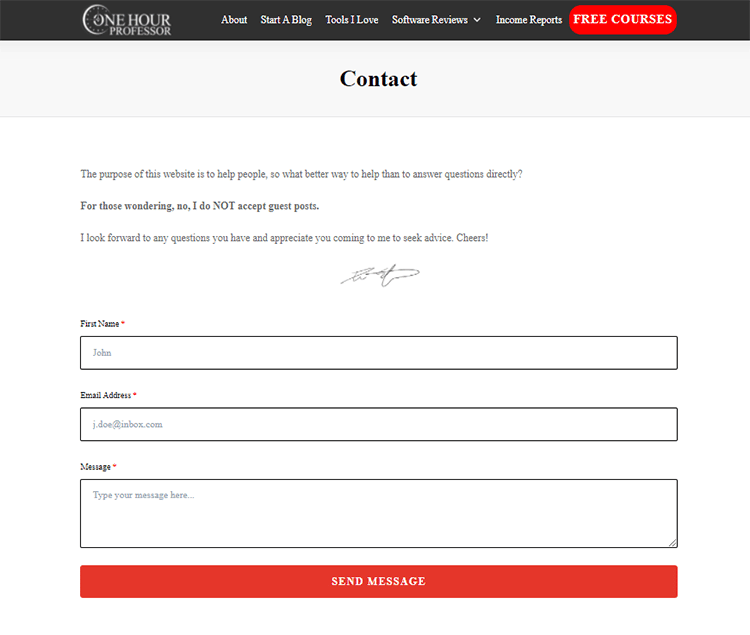
You must have a WordPress plugin contact form in order for individuals to contact you regarding consulting (duh).
There are many other Contact Form WordPress plugins available to assist with this, but I personally use Contact Form 7. It is cost-free, portable, and simple to use.
4. Market yourself
The next step in earning money from blogging is to sell your brand on social media and on your blog. You can post it on Facebook, Twitter, Linkedin, Instagram, or any other social media platform where you have a presence. You can include a link to your consulting service offer on your blog's homepage or in the navigation.
Make it clear that you offer to advise on and produce material that your ideal client would find interesting.
Editors Note
Most people neglect them as resources but don’t be scared to look on Craigslist and Fiverr for someone who might be interested in your services. It’s a great way to land your first few clients!
5. Gather leads and choose the best fit
People will begin contacting you looking for services and asking about how to make money after you have a blog up and have invested the time to create material for it. You now need to collect these leads and decide which clients might benefit from your consulting services.
This is difficult to decide when you first start out, so start by getting your first few clients to see what you like and dislike about them as well as the overall process of working with others.
6. Do your best work
Make sure to try your best to satisfy any new clients you may have. Although it should be obvious, this is crucial because word of mouth will increase your consulting possibilities. If you perform a wonderful job, they're a lot more inclined to recommend you to other people.
3) Sell Digital Products
Selling digital products is the next tip that will help you learn how to earn money from blogging. It doesn't matter if this is a PDF, a set of plans or instructions, an app, an online course, or even an eBook. The concept is that you have your own products available for purchase on your website, which you may direct visitors to if you can persuade them that it offers sufficient value.
How to Start Selling Digital Products
1. Choose a product complementary to your site visitors for blog traffic
So, how can you do it? Simple. Determine your target audience and consider their needs. My blog, for instance, is all about online commerce.
So it would make sense for me to have an eBook about, say, the best practices for affiliate marketing and other blogs and digital marketing.
At this stage, you must spend some time getting to know your audience and determining what they want. If you're just starting out, this can be challenging because you don't have a large audience to speak to.
Utilize analytics to comprehend your blog's most popular post or posts, and then produce an instructional product that readers of those posts would be eager to purchase.
The procedure is being made simpler by me, but it doesn't need to be. Simply take a look at the blog themes and posts that are bringing in the most readers to your blog to determine how to create a product that meets their needs.
2. Create an outline
Make an overview for your book, plans, instructions, PDF, or whatever else you're producing next. You must approach this from a high level of thought.
Make a thorough outline that addresses every facet of what your product must provide. It will be crucial for you to think through every detail of the finished product during this activity.
3. Write the info product
The info product must then be written. Again, concentrating on finishing one task at a time is the best approach.
Try not to try to do it all in one day. Instead, concentrate on advancing every day for a week, two weeks, or even a month. I've published a lot of blog pieces throughout the years, and some of them are rather long.
I've discovered that working on these posts/guides daily rather than forcing myself to do them all at once is the best way to produce them. I start to lose my inspiration and my writing suffers if I work on one piece of content for too long in a day. Knowing this, I thus urge you to produce a small amount of work each day.
4. Choose a place to sell it
Once you’ve created your info-product, you’ll need a way to sell it.
Your Website
The best place to sell your goods is on your website. Usually, that's where you'll be able to earn money from blogging. Having said that, it's also essential to keep website visitors safe and ensure the security of their personal information. By encrypting it with SSL, as I personally do on all of my websites, you can assure that your customer's data is not stolen.
It doesn't mean you shouldn't sell it there even if there isn't much traffic; it just means you'll have a smaller audience to promote to. Consider using Sellfy, about which I've published a complete review if you want to accomplish this for a low cost on a site that is incredibly user-friendly for beginners.
Amazon Self Publishing

If you choose to write an ebook, you might consider trying to sell it on Amazon. With the help of a system called Amazon KDP, you can list eBooks for sale on Amazon. Although there is a cost associated with each ebook edition you sell, they have access to a sizable market, so it's something to think about.
Due to the size of its market, Amazon can provide a sizable audience for the purchase of your ebook. That's great, but there will be a lot more competition to make a sale, so keep that in mind.
Making an audiobook version of your ebook and selling it on Audible is one method to stand out from the competition. With the correct market fit, this strategy can be quite lucrative.
ClickBank
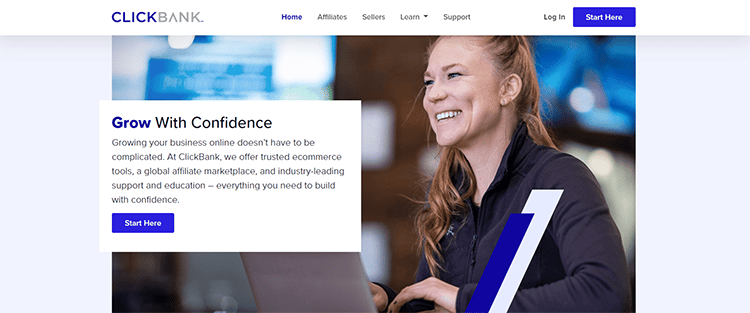
The well-known affiliate marketplace ClickBank is another place to offer an info product. Posting your goods to their marketplace is what you do here, and an army of affiliate marketers on this site will sell it for you.
This is fantastic because it increases the likelihood that affiliates will promote your information product on your behalf if it converts well and sells well. Consequently, even though you'll make less in each sale, you'll make much more overall, which can help you expand your brand and the product as a whole.
There is nothing prohibiting you from launching it in all three locations if you so choose. However, in the end, you must decide where to start and then proceed from there.
5. Use Gumroad if you sell on your website

Here's a helpful tip for anyone selling on their website: use Gumroad. This platform is convenient since it enables you to set the price for your product. Customers can then checkout and download your information product using ONLY a credit card.
It decreases friction in the sales process and is quick and easy.
The "pay-what-you-want" approach is another interesting feature of it. The main idea is that if you're unsure of how much to charge for your information product, you may tell your clients to pay whatever they want. I wrote a piece about this a while back, which you can find here.
If you're curious, the model is effective.
I successfully make a few hundred bucks each week using the pay-what-you-want business approach.
Identifying the average contribution is crucial to the pay-what-you-want pricing strategy. This provides them with a starting point for how much to give, and each time I did make money this way, it was exactly the amount I stated was typical.
6. Market your product
The final step to help you earn money blogging after everything is set up is to promote your product. There are various ways to do this, but I believe the simplest place to begin is by identifying the blog posts that receive the greatest traffic and linking to advertisements for the info product on those pages.
You might also use social media, such as Facebook groups, Pinterest, Instagram, or wherever you are active. It's an excellent opportunity to promote your information product and, ideally, get some individuals to buy it.


